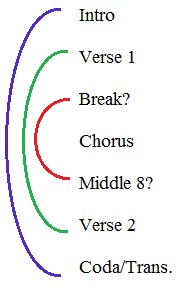|
Formal structure of "Sergeant Pepper's Lonely Hearts Club Band" Intro 0:00-0:23* Verse 1 0:23-0:43 Break? 0:43-0:56* Chorus 0:56-1:26 Middle 8? 1:26-1:38* Verse 2 1:38-1:58 Coda/Trans. 1:58-2:05 Comments: The introduction is again in two parts (similar to [6b] "A Taste Of Honey", [11] "Thank You Girl", [17] "Little Child", [14b] "Roll Over Beethoven", [24] "You Can't Do That", and [31b] "Matchbox", [37] "Baby's in Black", [38b] "Mr. Moonlight", [45] "I Feel Fine", [46e] "Honey Don't", [47] "Ticket to Ride", [62] "Run For Your Life", [63] "Norwegian Wood (This Bird Has Flown)", [65] "Day Tripper", [66] "If I Needed Someone", [77] "Tomorrow Never Knows", [79] "Love You To", [81] "Paperback Writer", [82] "Rain, and [84] "Taxman", [89] "I Want to Tell You", and [92] "She Said She Said"), with the first 12 seconds consisting of nothing but background noises, and the next 11 seconds featuring the "music proper", which establishes the tempo, tonality, and character for the song and ultimately the rest of the album. The section right after verse 1 is clearly a break (which I defined as "a break for the singer") as the band instruments play, temporarily relieving the lead vocals. Tonally, during this break, the song tonicizes C major instead of G major. This same chord progression and thus tonicization also occurs in the section right after the chorus, however in this case the band is replaced with two- and sometimes three-part vocal harmony. Clearly this is not a break since it's not "a break for the singer", but at the same time is equally clearly the same music (i.e. the same chords, same bassline, same drum beats - just with vocals replacing the band). Furthermore, the fact that these sections both tonicize C major suggest that they function rather like a middle 8 (which I defined as "a contrasting section in the middle of a song"). With their location in the middle of the song, and in tonicizing a different key, clearly these passages fit the criteria of middle 8. In this way, the defining characteristics between break and middle 8 are blurred, and for these reasons I have included question marks in the above analysis. Regardless of choices in diction and defining characteristics of formal sections, the break/middle 8 sections in question are nearly identical, and that relation creates a clear palindromic structure for this track: "Sgt. Pepper" is the fourth Beatles song to date to employ a palindromic formal structure, the others being [33] "I'll Be Back", [93] "Strawberry Fields Forever", and [94] "When I'm Sixty-Four".
0 Comments
Despite being rock 'n' rollers, The Beatles were very polite in their lyrics. Of the 213 songs recorded by the Beatles and released on their albums, 25 (12%) use the word "please":
Love Me Do (1962): "Love, love me do. You know I love you. I'll always be true, so please love me do." Chains (1963): "Please believe me when I tell you your lips are sweet" Please Please Me (1963): "Please please me like I please you" I Want to Hold Your Hand (1963): "Oh please say to me you'll let me be your man, and please say to me you'll let me hold your hand." Don't Bother Me (1963): "But till she's here please don't come near, just stay away" Please Mr. Postman (1963): "Please Mr. Postman look and see if there's a letter, a letter for me" You Really Got a Hold on Me (1963): "I love you and all that I want you to do is just hold me please, hold me squeeze, hold me" Mr. Moonlight (1963): "Mr. Moonlight, come again please. Here I am on my knees begging if you please." If I Fell (1964): "If I trust in you, oh please, don't run and hide. If I love you too, oh please, don't hurt my pride like her." When I Get Home (1964): "Come on, if you please, I got no time for trivialities." You Can't Do That (1964): "So please listen to me if you wanna stay mine" I Don't Want to Spoil the Party (1964): "If she turns up while I'm gone please let me know." What You're Doing (1964): "Please stop your lying, you got me crying girl" Yes it Is (1965): "Please don't wear red tonight" Day Tripper (1965): "Tried to please her, but she only played one night stand." Help! (1965): "Won't you please, please help me?" I Need You (1965): "Please come on back to me. I'm lonely as can be. I need you." "Please remember how I feel about you. I could never really live without you." Nowhere Man (1965): "Nowhere man please listen, you don't know what you're missing." I'm Only Sleeping (1966): "Please don't wake me, no don't shake me, leave me where I am I'm only sleeping." "Please don't spoil my day, I'm miles away, and after all I'm only sleeping." Blue Jay Way (1967): "Please don't be long, please don't you be very long, please don't be long or I may be asleep." Martha My Dear (1968): "Martha my dear, though I spend my days in conversation, please be good to me." Honey Pie (1968): "Honey Pie, you are making me crazy, I'm in love but I'm lazy, so won't you please come home." Come Together (1969): "He got hair down below his knee, Got to be a joker he just do what he please." Oh! Darling (1969): "Oh, darling, please believe me. I'll never do you no harm." I've Got a Feeling (1969): "Oh please believe me, I'd hate to miss the train." P.S.: For those who are wondering, only 2 Beatles songs use "thank you": Thank You Girl (1963): "And all I gotta do is thank you girl, thank you girl." Sgt. Pepper's Lonely Hearts Club Band (1967): "We'd like to thank you once again." |
Beatles BlogThis blog is a workshop for developing my analyses of The Beatles' music. Categories
All
Archives
May 2019
|

 RSS Feed
RSS Feed
